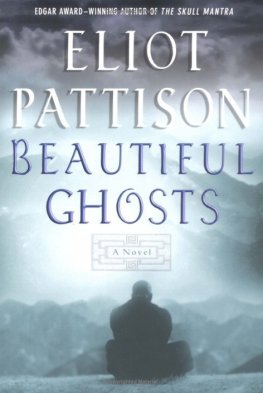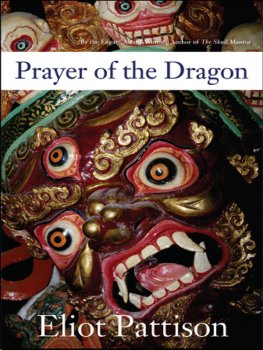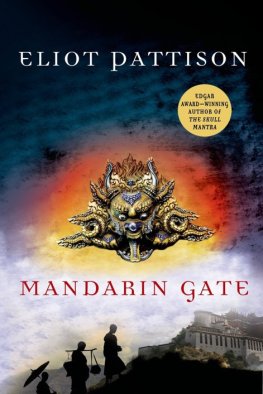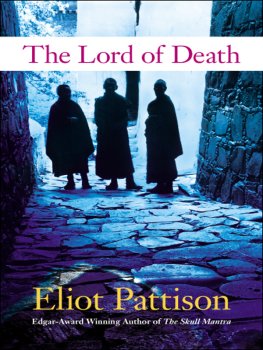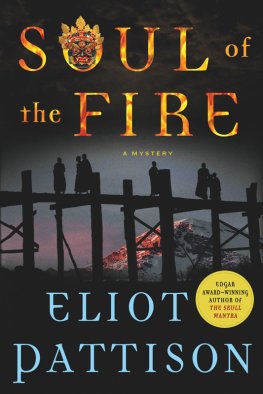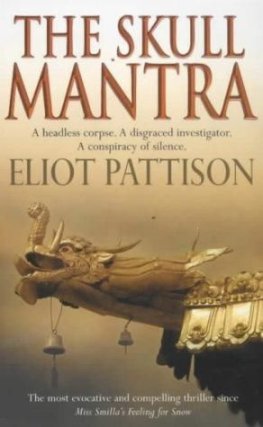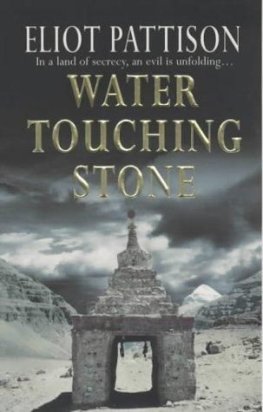Eliot Pattison - Beautiful Ghosts
Here you can read online Eliot Pattison - Beautiful Ghosts full text of the book (entire story) in english for free. Download pdf and epub, get meaning, cover and reviews about this ebook. genre: Detective and thriller. Description of the work, (preface) as well as reviews are available. Best literature library LitArk.com created for fans of good reading and offers a wide selection of genres:
Romance novel
Science fiction
Adventure
Detective
Science
History
Home and family
Prose
Art
Politics
Computer
Non-fiction
Religion
Business
Children
Humor
Choose a favorite category and find really read worthwhile books. Enjoy immersion in the world of imagination, feel the emotions of the characters or learn something new for yourself, make an fascinating discovery.
- Book:Beautiful Ghosts
- Author:
- Genre:
- Rating:3 / 5
- Favourites:Add to favourites
- Your mark:
- 60
- 1
- 2
- 3
- 4
- 5
Beautiful Ghosts: summary, description and annotation
We offer to read an annotation, description, summary or preface (depends on what the author of the book "Beautiful Ghosts" wrote himself). If you haven't found the necessary information about the book — write in the comments, we will try to find it.
Beautiful Ghosts — read online for free the complete book (whole text) full work
Below is the text of the book, divided by pages. System saving the place of the last page read, allows you to conveniently read the book "Beautiful Ghosts" online for free, without having to search again every time where you left off. Put a bookmark, and you can go to the page where you finished reading at any time.
Font size:
Interval:
Bookmark:
Eliot Pattison
Beautiful Ghosts
PART ONE
CHAPTER ONE
There are sounds in Tibet heard nowhere else in the world. Hollow moans inexplicably roll down the slopes of snowcapped peaks. Rumbles like thunder course through valleys under cloudless skies. On moonlit nights in the mountain wilderness Shan Tao Yun had heard tiny ringing tones floating down from the stars.
At first, lying on his gulag prison bunk, Shan had felt fear at hearing such eerie sounds. Later he had decided they had to be the workings of the thin, high altitude atmosphere and the wind, of shifting ice formations and temperature changes between summits and valleys, had concluded there were scientific explanations. But after five years Shan was no longer certain. After so long in Tibet, he had abandoned most of his prior beliefs about the workings of the world.
Certainly the wrenching sound that now rose across the bowl in the mountains could have no explanation in the physical world. A young woman standing near Shan groaned, clapped her hands to her ears, and ran away. The first time he had heard the sound that came from the red-robed man sitting thirty feet away, Shan, too, had shuddered and wanted to flee. Throat chanting, the monks called the strange grinding moan, but Shan preferred the description used by his old friend and former cellmate Lokesh. Soul rattling, Lokesh called what Surya, the old monk, was doing, explaining that in the world below, souls were often so undeveloped that the only time the sound was heard was in those near death as the soul struggled for release. But in Tibet no one spoke in fearful tones of the death rattle. Here the sound was for the living. Here the devout had learned to make souls speak without tongues.
Shan watched the woman retreat with a pang of sorrow. It was a day of great joy, but one of even greater danger. The outlaw monks Shan lived with, who for decades had remained hidden in their secret hermitage, had decided not only to reveal themselves to the hill people but to lead the strangers in illegal rituals. This would be a day of wonderful surprises, Gendun, their senior lama, had declared, one of the days when the world was changed.
Shan had warned the monks about the danger of bringing these particular Tibetans to the ruined monastery. Gendun had replied by dropping onto one knee and turning over a pebble, invoking a teaching the monks sometimes used. The world could be changed by the subtlest of actions, so long as it was pure, and even the smallest of actions was pure so long as it was free of fear and anger. But these herders had been conditioned by fear all their lives.
Beijing had dealt harshly with the people of the rugged lands of southern Lhadrung County, who had stubbornly resisted the Chinese occupation long after Beijings army had seized Lhasa. The ruins they now stood among were all that remained of Zhoka gompa, the monastery that for centuries had served the people living south of the countys central valley. Forty years earlier it had been attacked from the air by the Peoples Liberation Army, one of the thousands of gompas annihilated by Beijing. The brave, devout people who had futilely tried to defend Zhoka and the way of life it represented had been dispersed, destroyed, or simply hollowed out.
Well be arrested! a woman in a tattered red vest had warned when Shan and Lokesh had met them on the grassy ridge above and motioned them to descend toward the half-mile-wide tract of ruined buildings.
Its haunted! another herder had protested as Lokesh had stepped into the maze of crumbling stone walls. Even the living become like ghosts here!
But when Lokesh kept walking, singing an old pilgrims song, the man fell in behind his companions to enter the ruins. They had followed in an uneasy silence until they had emerged in what had been the gompas central courtyard.
A miracle! the woman in the red vest had gasped as she clutched at an old woman beside her and gazed at the ten-foot-high shrine, obviously newly constructed, which stood in the center of the yard. The two women advanced hesitantly, watching Surya, who sat in front of the shrine. They touched the brilliant white structure, skeptical at first, as if not believing their eyes, then reverently sat before the monk. Others had slowly followed, some touching strings of beads that hung from their belts.
But now, as Suryas throat chant began, several of the hill people retreated toward the shadows. Those who remained seemed paralyzed by the sound, staring wide-eyed as Surya joyfully threw his head back, still chanting.
Godkiller! The shout came from nowhere and everywhere, echoing off the ruined walls. A stone flew past Shans shoulder and bounced off Suryas knee. Murderer! the same fearful voice cried. The monks chant faltered, then stopped as he stared at the stone that had been aimed at him.
Godkiller! As the word was repeated Shan spun about to see a short, leathery-faced man in the tattered clothes of a herder, pointing at Surya with rage in his eyes.
By the time the herder raised another stone Shan was at his side, clamping a hand around the mans wrist. The man resisted, twisting his hand, pushing Shan. Flee for your lives! The murderers! the herder cried out to the others who lingered in the yard.
A tall, lean Tibetan, a stubble of white hair on his scalp and jaw, appeared at the mans other side and the herder, studying him uncertainly, stopped moving. Lokesh pried open the herders fingers, letting fall the pebbles they held. Surya is a monk, he said quietly. He is the opposite of a godkiller.
No, the herder growled as Suryas chant started anew. It was not anger, but despair that now filled the mans eyes. The government puts men in robes to trick us, to get us to act out the old ways, then they arrest us, or worse.
Not here, Lokesh said. Not today.
The man shook his head then, as though to refute the old Tibetan, gestured into the shadows between the crumbling stone walls behind him.
A woman appeared, her hands behind her, gripping two corners of a rolled blanket. Two boys, the oldest no more than ten, walked behind her, solemnly carrying the other end of the long burden inside the blanket, their eyes gaunt and weary. As the three reached the herder they lowered their heavy load, the boys darting to the woman, burying their heads in her heavy felt skirt, the youngest releasing a long, silent sob.
As Lokesh knelt and slowly pulled back an edge of the blanket, a hoarse groan escaped his throat.
It was an old man with a thin, wispy beard. His left ear hung loose where it had been nearly ripped away, the left side of his face was caked with blood and sagging where his cheek and jawbones had been ravaged. His lifeless eyes seemed to look up at the sky in question.
They beat him to death, the herder declared in a low whisper, still eyeing Shan and Lokesh warily. Just beat him and left him like that.
Shan bent and pulled the blanket down. Both the mans legs appeared to be broken, one turned at an unnatural angle, the other bloody at a tear in his trousers that exposed a piece of bone. Who would do such a thing? he asked, looking at the empty brown eyes.
His name was Atso, the herder said. Over eighty years old. He lived alone in a hut at the base of a cliff two miles to the east, toward the valley. The herders eyes filled with pain and he paused for a moment, as if struggling to control his emotions. Of all the people in the hills he was the one who knew most about the old ways.
Someone killed him for following the old ways? Shan asked.
The herder shrugged. They kill for a word in these hills, he said in a hollow, matter-of-fact tone that sent a chill down Shans spine. The man extracted a knife from his belt and with the blade pushed a twig of heather from Atsos hair. The Tibetans were loath to touch the dead. The only way he would let strangers near him would be if one wore a robe, he said in an accusing tone, casting a worried glance toward the woman and boys, who moved toward the throat chanting. Murderers are among us, he whispered.
Font size:
Interval:
Bookmark:
Similar books «Beautiful Ghosts»
Look at similar books to Beautiful Ghosts. We have selected literature similar in name and meaning in the hope of providing readers with more options to find new, interesting, not yet read works.
Discussion, reviews of the book Beautiful Ghosts and just readers' own opinions. Leave your comments, write what you think about the work, its meaning or the main characters. Specify what exactly you liked and what you didn't like, and why you think so.

